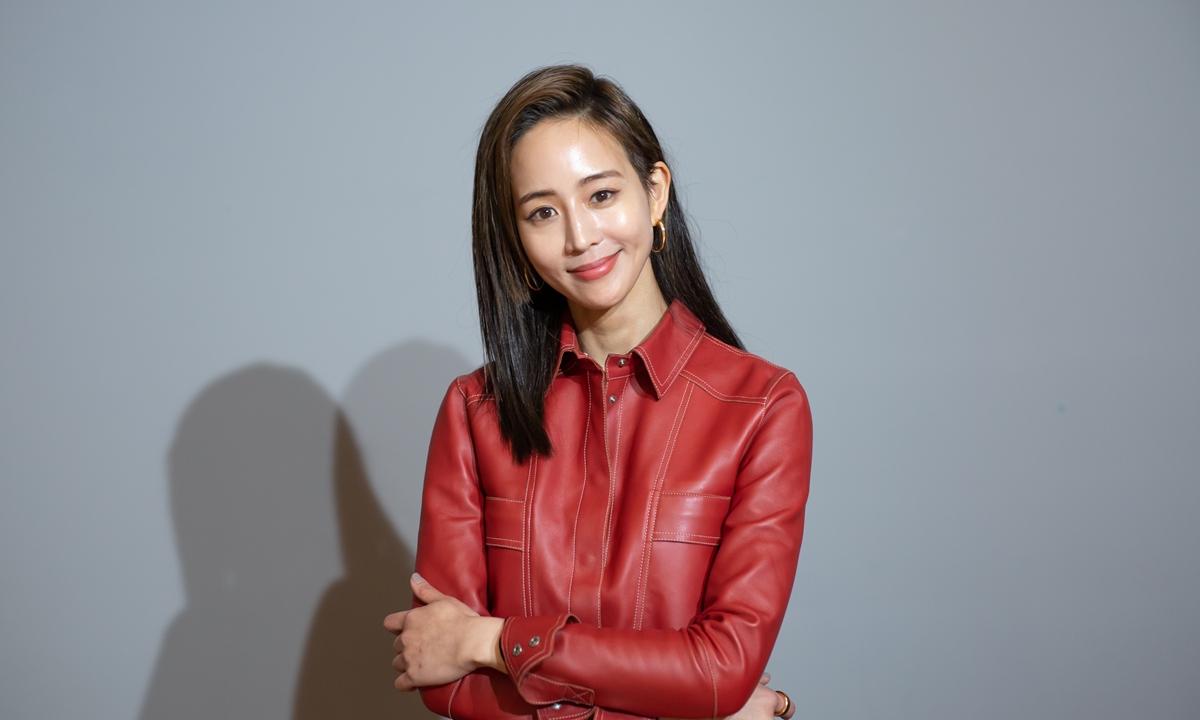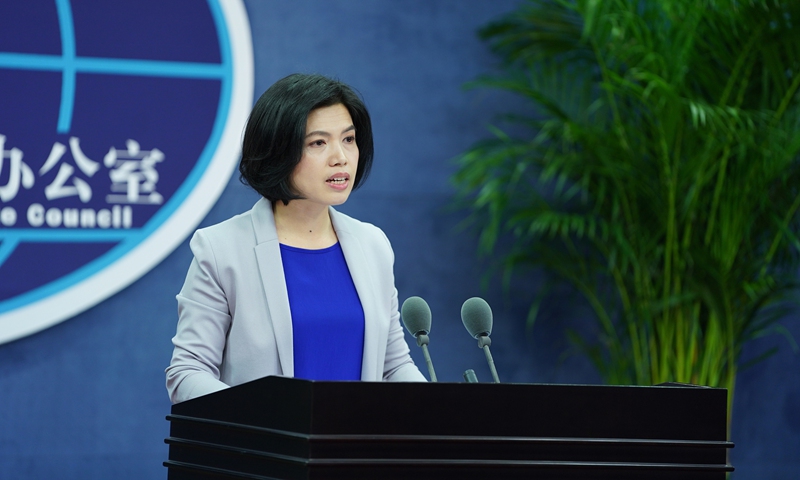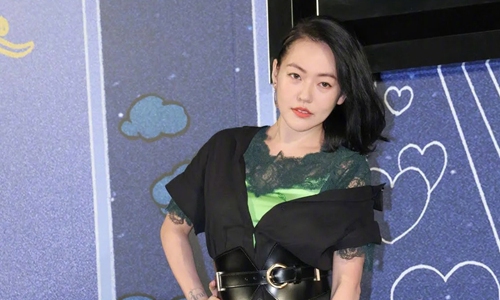IN-DEPTH / IN-DEPTH
Speculations rise that DPP’s ‘online army’ may have targeted Taiwan entertainers to create cross-Straits antagonism
Backstage manipulator

Actress Chang Chun-ning from the island of Taiwan Photo: VCG
The latest farce in which entertainers from the island of Taiwan, represented by Janine Chang Chun-ning (Chang), have been labeled as secessionists has exposed potential political maneuvers of Taiwan's Democratic Progressive Party (DPP) authority who deliberately seeks to provoke, smear certain Taiwan entertainers as separatists, and create cross-Straits antagonism using online mercenary tactics.
Observers from both sides of the Taiwan Straits have stressed that blaming stars for their verbal gaffes, or netizens for their sensitivities, could create a distraction from the issue. They alerted real potential culprits who have engaged in website trolling tricks to leverage their latest attack against the mainland, as separatist forces led by Taiwan's DPP have been skillful in fanning sentiment online and have launched public opinion warfare.
Based on long-term observations, mainland netizens have been increasingly capable of discerning separatist-minded celebrities from ordinary entertainers from Taiwan, Wang Shushen, a Taiwan affairs expert at the Institute of Taiwan Studies Chinese Academy of Social Sciences told the Global Times.
Wang stressed a clear gap between entertainers' occasional verbal gaffes and long-term, consistent political positions, and advised that more attention is needed to identify real separatist entertainers and those who were targeted by the forces trying to drive cross-Straits antagonism.
Taiwan Affairs Office of the State Council said last week that recent "secessionist" accusations against some Taiwan celebrities were probably deliberately hyped up by separatist political forces on the island, after another popular TV hostess, Dee Hsu, from the island, was also tagged as a "secessionist" with rumormongers fomenting online anger toward her.
Chang, soon after the Hsu incident, was tagged as a "separatist" after her master degree paper was revealed to allude to "Taiwan" as a "country." The paper, with the title of "Legal issues of entertainer management in the country," was criticized as supporting "Taiwan independence" for using the word "country."
Chang and her group made an immediate clarification that Chang does not support "Taiwan independence" and has always identified herself as a Chinese.
"What the 5,000 years of Chinese civilization let us learn is to behave in a dignified Chinese way indomitably," Chang said in the announcement on China's Twitter-like social platform Sina Weibo.
In fact, Chang has been viewed as one of the most patriotic actresses from the island as reflected in many of her posts across her social media including donations to the mainland and support in the severe flood disaster in Central China's Henan Province in July.
She was also one of the earliest entertainers from Hong Kong and the island of Taiwan to terminate contracts with brands involved in Xinjiang cotton smear campaign.

Zhu fenglian Photo: VCG
Chang's incident is far from the first time that pro-reunification celebrities from the island have been caught up in tensions between the Chinese mainland and the island of Taiwan.
Popular Taiwan TV hostess, Dee Hsu, has repeatedly clarified since August that she is not a "secessionist" after several brands terminated their cooperation with the star and her daughter for describing a badminton athlete from Taiwan as "national player."
In the face of the whirlwind of public opinion, both Hsu and Chang soon firmly identified themselves as Chinese, which is undoubtedly a clarification of their position on cross-Straits relations, Wang remarked.
"However, what is intriguing is that the two incidents have triggered a huge public outcry and even created political effects. The DPP and separatist forces have benefitted from the antagonism and cannot be ruled out from deliberately creating trouble in cyberspace, inciting confrontation between people on both sides, and worsening cross-Straits relations," Wang noted.
Fixed patterns and political tricks
The Global Times found that attacks on these celebrities follow a familiar pattern: First, cataloguing historically improper acts or words of Taiwan celebrities active in the mainland, and magnifying or even demonizing those behaviors; then, the so-called angered "public opinion" is created through a large number of internet trolls, which then sets off a storm across mainland's social media; finally, relevant news and comments are fed back to Taiwan cyberspace, playing up hostility toward the mainland and widening the gap between people across the Straits.
Such pattern has been used successfully in previous cases.
In May when Taiwan struggled with a severe COVID-19 resurgence, Lin Wei-feng, a pro-DPP advocator on the island, decried Taiwan's Bulletin Board System PTT for being "invaded" by supporters of the Communist Party of China (CPC), saying that many pro-CPC people had slanted Taiwan's epidemic prevention on the platform. The region's separatist leader, Tsai Ing-wen, also urged the public not to believe these criticisms.
However, awkwardly, netizens soon discovered that one of the so-called pro-CPC accounts that criticized Taiwan authority was actually Lin himself who purportedly instigated hatred against the mainland.
The backlash is also evident in recent examples. "Hsu and Chang crises also caused a huge storm in the island of Taiwan, but what we saw in Taiwan's major newspapers and TV programs was not the incident itself, but the 'violence' of mainland netizens against Taiwan stars. These brash and sensational words portrayed mainland netizens and the government as bullies, and Taiwan stars as exposed victims crushed under the weight of 'oppression,'" a senior Taiwan media professional and a professor at the School of Communication of Ming Chuan University in Taipei surnamed Huang told the Global Times.
There has been speculation on the island that both accidents were caused by the DPP-trained online trolls posing as mainland netizens across the mainland's social media platforms, criticizing the potential "separatist" deed with fierce words, which led to the fomentation of the incident and was constantly politicized and hyped further. Some commentators see this as another avenue of the DPP's "public opinion warfare" against the mainland.
On Chang's Instagram, the Global Times found that her latest post had been flooded with abusive comments from Taiwan netizens. However, these accounts appear to be robot accounts with many of them having posted or ran nothing on their respective pages.
The insults would be posted at regular intervals, with a cluster of them coming every few hours on a regular basis.
Swarming regularly, giving thumbs up to each other, using templatized words - observers have pointed out that these are typical tricks used by the DPP-run "online army."
This so-called "online army" serves specific political interest groups by calculatingly organizing political attacks or defenses, gathering intelligence, or manipulating online public opinion, Hou Han-ting, a Taiwan political commentator, and Taipei city councilor with the New Party, told the Global Times in a previous interview that the DPP and its affiliates are all good at using the "online army."

Photo: VCG
In Taiwan, the "online army," also known as "1450" comes from the DPP government's plan to allocate NT$14.5 million in 2019 to employ a small number of editors to "correct" information on the internet. The practice was accused of taking taxpayers' money to support the "online army" to clarify information deemed unfavorable to the DPP.
The Global Times probed the "online army" group's tools and tricks in controlling public opinion online, and found out that DPP-affiliated departments and relevant foundations are the financial supporters and "base camp" for these "online army" forces.
These forces attempted to disrupt and obstruct the normal development of Taiwan entertainers on the mainland, wreck cross-Straits cultural exchanges, sow discord between compatriots on both sides of the Straits, and undermine cross-Straits relations, the spokesperson of the Taiwan Affairs Office of the State Council Zhu Fenglian said on a comment about online attacks against Dee Hsu.
"We hope and call on compatriots on both sides of the Straits to be highly vigilant on it," she added.
Huang noted that currently under the brainwashing of the DPP, some young people in Taiwan are compelled by separatist thought, but many more are disgusted by the political hype of the DPP, and most of the celebrities who have developed their careers on the mainland mostly love the country.
"But it's a bummer that these stars are being targeted by the DPP and maliciously labeled as 'pro-mainland' by the DPP-backed media, and are described as profit-seekers. However, when celebrities are in crisis, the forces play up their encounters to gin up confrontations and even hostility to serve their separatist strategies. Their motive is clear and execrable," Huang said.


